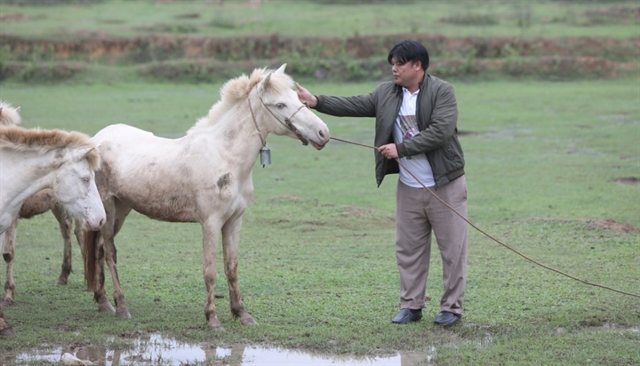
BẮC GIANG — The ethnic people in mountainous areas of Bắc Giang Province have had better lives in recent years thanks to taking advantage of extensive grazing grounds with abundant food sources to raise white horses.
People in the communes of Biên Sơn, Phong Vân, and Tân Sơn (of Lục Ngạn District) mainly work in cattle farming. They also raise horses to serve the transport of goods through hilly and mountainous routes.
However, due to the impact of the pandemic, some households have switched to raising white horses.
Realising the high economic efficiency and taking advantage of the large hilly and forest land, many households in the communes boldly invested in raising white horses.
Thanks to the stable output market, this model has opened a new direction in economic development in mountainous communes.
Vi Văn Nhuần, a horse breeder in Phong Vân Commune, said that his family’s life was tough, but two years ago, he got a soft bank loan and bought three stud horses for breeding.
Since then, his family had sold a batch of stallions at the price of VNĐ45-50 million (US$2,000-2,200) for each horse.
Thanks to this, his family’s life has significantly improved, and he has bought one more stallion.
According to Nhuần, raising white horses takes advantage of natural resources such as grass, corn leaves, corn or paddy fields.
Each household only needs to invest VNĐ50-60 million ($2,200-2,600) to buy a five-month-old foal. After three years, the mares start to reproduce if well cared for. On average, the mare will give birth to one foal per year, Nhuần said.
A five-month-old pony could later be sold as a stallion. If raised to adulthood, it can be sold at VNĐ50-55 million per head. He said that the male horses have a higher economic value, averaging about VNĐ55-60 million each.
“The raising of white horses is relatively easy because it does not require too much technology and can take advantage of the grazing area and natural food sources and bring much higher economic efficiency,” said Nhuần.
According to many other white horse breeders, horses raised for more than five months sell for VNĐ50-65 million each, nearly double that of other horses. Adult white horses can go for VNĐ80-120 million per head.
To increase the herd, households focused on taking care and processing food for them, such as paddy, corn, straw, hay and corn stalks.
The disease prevention and treatment for horses are paid more attention to, including cleaning techniques, disinfecting of stables, quarantine and vaccination.
Herds of white horses have consistently grown, which has brought economic benefits to the ethnic minorities in Lục Ngạn District.
Support from local government
Vi Văn Phục, vice chairman of the People’s Committee of Phong Vân Commune, said that breeding white horses was an effective economic breeding model in the commune that helped many households have better lives.
The local government has the policy to instruct villages in the commune to replicate the model and expand it to the whole commune, Phục said.
Currently, Phong Vân Commune has 1,600 horses of many kinds, of which white horses account for 65-70 per cent.
“In the coming time, we will continue to create conditions for households to increase herds of horses, particularly white horses,” the vice-chairman said.
“We also encourage the breeders to apply science and technology in animal husbandry to meet the market’s increasing demand.”
Nguyễn Thế Thi, vice chairman of the People’s Committee of Lục Ngạn District, said that the commodity white horse breeding model of the people in mountainous communes had brought success.
At present, there are about 4,500 horses of all kinds, mainly in Biên Sơn, Vân Phong and Tân Sơn communes.
While horse breeding households have well-followed the guidance of the agricultural sector.
With the experience of livestock husbandry and advanced breeding techniques, the white horse herds are growing and developing very well, and the possibility of replicating the model is high.
“White horse breeding has given encouraging results to help people increase their incomes, eliminate hunger, reduce poverty, and contribute to local economic development,” Thi said.
“In the future, the district’s agriculture department will continue to support horse breeding households by supplying stallions. The district will support breeders with access to bank loans and vaccinations, and provide training courses on breeding skills and expanding herds to establish white horse breeding cooperatives to ensure output and input.”
The breeding of white horses has contributed to the formation of commodity production areas, gradually changing the breeding practices of ethnic people in the mountainous regions by applying for scientific and technical advances and implementing a sustainable and closed livestock production process.
Additionally, the white horse breeding model in Lục Ngạn District has also contributed to creating jobs for farmers, increasing incomes, promoting concentrated husbandry, improving product quality and contributing to hunger eradication and poverty reduction for the ethnic people. — VnExpress News
- Reduce Hair Loss with PURA D’OR Gold Label Shampoo
- Castor Oil Has Made a “Huge” Difference With Hair and Brow Growth
- Excessive hair loss in men: Signs of illness that cannot be subjective
- Dịch Vụ SEO Website ở Los Angeles, CA: đưa trang web doanh nghiệp bạn lên top Google
- Nails Salon Sierra Madre
 VnExpress News The News Gateway of Vietnam
VnExpress News The News Gateway of Vietnam





